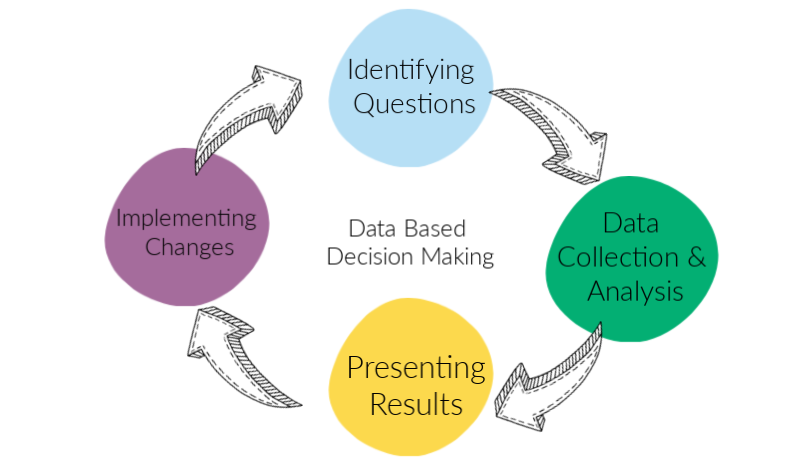Entrepreneurs like to be in charge, which is probably how they find themselves in that position in the first place. They like to make decisions and have projects follow their guidance to the letter.
This is phenomenally helpful when getting started or getting a company off the ground, but this mindset can be disastrous if left unchecked as their company grows.
Every new project a company takes on is an experiment. New growth initiatives, new product launches, pivots in ideal clientele, adapting marketing efforts—all require a bit of flexibility and a healthy dose of testing to ensure it’s the right move.
To keep your business growing, you need a process of checks and balances to ensure that your new initiatives are successful. What are those checks and balances? Data based decisions.
Why Shouldn’t a Business Owner Just Make All the Decisions?
Without a data-based decision making process, an entrepreneur can’t know what is actually successful for their business.
No matter how well they think they know their customers, a business owner can’t be 100% sure that what they THINK is right, will be right.
Everyone naturally sees things from their own perspective. It takes active thought and active work to put yourself into the user’s perspective.
Some people make this their entire profession. Even if you’re a pro at putting yourself in others’ shoes you can still get it wrong.
When company decision makers are in it for too long, they’re “too close,” and it can be extremely difficult to see where they’ve strayed off course.
This is especially true for people that are experts—you’re an expert, your audience isn’t. Herein lies the importance of data based decision making for your business.
Following your data lets you see what your audience wants to engage in and what you should do more or (and less of).
Video: Top 10 Email Marketing Metrics to Track
The 9 Best Customer Behavior Metrics to Track How to Map Your Customer JourneyChallenges of Using Data in Your Projects
Data takes away the guess work and makes decision making more clear.
By conducting tests and looking at the results, you’ll be better able to know with confidence that the move you’re making is the right one for your business. Just because decision making is important, doesn’t mean it’s easy to do.
Data based decision making means letting go of control
One big challenge is letting go of control and allowing decisions to be guided by the data. The numbers will prove you wrong sometimes, and you have to learn to be okay with that. This can be a tough pill to swallow, but if you want to succeed in your business you have to get over it.
It’s easier to make decisions on a whim
Entrepreneurs often fly solo, which makes it exponentially easier to be drawn to making important decisions on a whim. It may seem easy to work in this way, but one wrong move and you’ll be back at square one—unsure of what’s wrong, unclear on how to move forward, and entirely ready to give up. You, maybe more than any other entrepreneur, need to take up data-based decision making.
It takes time out of your busy week
Yes, data collection and decision making does take time. Entrepreneurs, especially when we’re struggling, are really good at convincing themselves that they’re really busy with the details. The truth is, when you get in the habit of making data based decisions, it will save you time because you’ll be able to focus your attention on tasks that actually work for your business.
You’re not alone. This is precisely why you must use data to make decisions for your company. If you want your brand to grow, you have to be open to the fact that you won’t always know what the best move will be.
The Data Based Decision Making Process
So here’s how it works.
Step 1 – Ask Key Questions
You have to begin by identifying the key questions you’d like answered with your data. It’s important to be very specific here because too many variables here won’t give you clean results.
Question examples: Does this ad copy bring in higher click through rates? Does this button color lead to a boost in conversion? Will this adset be interested and engaged with this ad image?
The questions at this stage should help you to solve a specific problem, learn more about your target demographic, or improve a program or process.
Step 2 – Collect & Analyze
Next you will need to set up how you will be collecting and analyzing data. Depending on the nature of your questions you’ll need to find ways to collect direct data for each purpose.
We have a few articles about the right way to collect your data—check out the recommended reading section above!
Step 3 – Present Results
If applicable, the results of the data should be presented and shared with your team, a business partner, or a trusted mentor.
We advise that another set of eyes be put on your data if at all possible. Like mentioned above, if you’re too close to the information it can be harder to see the bigger picture. Getting another opinion into the mix at this stage can be beneficial to gain additional clarity and add alternative perspectives.
Step 4 – Data Based Decision Making
Based on the results in step 3, it’s time to make decisions about what you might need to tweak. Once you put changes in place, you should watch your data carefully to ensure you’re seeing the desired results. If not, tweak a little more, there may have been a missing factor that you didn’t catch, or you may not have let your test run long enough.
At this stage, you will most likely have additional questions, or new questions you’d like tested… and the process begins again for step 1.
Data is a Necessary Evil
It may seem tedious, annoying, or like a waste of time to undergo this process for all major decision making within your company but it’s 100% necessary. #Sorrynotsorry get over that mindset… now.
Without this process you will never quite know if your trajectory is on course with what your customers want. Eric Ries of The Lean Startup stated, “Many features that make the product better in the eyes of the engineers and designers have no impact on the customer behavior.” You never quite know how your customers may interpret what you’re putting out there. Stop making assumptions and start using data.





2 thoughts on “The Importance of Data Based Decision Making”
Pingback: Conversion Rate Defined + Why Its Important | Dandelion Branding
Pingback: HotJar versus Crazy Egg: Best UX Testing Platform | Dandelion Branding